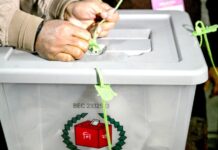Ties fraying over Washington threat to sanction officials who block ‘free’ polls

The U.S. is a top export destination for Bangladesh, but diplomatic relations have soured over Washington’s warnings about January elections in the South Asian nation. © AP
DHAKA — A high-level U.S. delegation will head to Bangladesh as a domestic political standoff threatens to upend national polls and with ties unraveling after Washington pledged sanctions against local officials who undermine free elections.
The South Asian nation’s previous two elections were dogged by claims of vote-rigging and other misconduct. Now, opposition parties are calling for the ruling Awami League to hand over power to a caretaker body that will “restore democracy” by ensuring free and fair voting in the January-scheduled polls.
The Awami League, in power since 2009, has rejected the idea and last week curtailed the Election Commission’s authority to postpone or cancel results over future reports of violence or other irregularities at polling centers across the country of 170 million.
The U.S. delegation, including U.S. Assistant Secretary of State for South and Central Asian Affairs Donald Lu and Under Secretary of State for Civilian Security, Democracy, and Human Rights Uzra Zeya, are expected to be in the capital Dhaka from Tuesday through Friday.
Washington has given few details about their trip. Zeya’s office has said she’ll be in India and then Bangladesh where she will meet with senior officials to discuss a range of issues, including “free and fair elections,” labor issues, human rights and combating human trafficking.
“We welcome the continuous engagement with the U.S.,” Foreign Minister A.K. Abdul Momen was quoted as saying by the country’s state-run news agency. “We have nothing to hide.”
In late May, Washington announced plans to promote free elections by restricting visas for “any Bangladeshi individual, believed to be responsible for, or complicit in, undermining the democratic election process.”
Prime Minister Sheikh Hasina and her allies reacted angrily to the new visa rule — widely perceived as a warning to the ruling administration — saying that it amounted to an attempt to topple the government. Close relatives of many Bangladeshi politicians live in the U.S. or Britain, including Hasina’s son who holds an American green card. The bulk of Bangladesh’s exports go to the West, with the U.S. the top destination.
Independent observers found serious flaws in the last two Bangladeshi elections. The main opposition Bangladesh Nationalist Party (BNP) boycotted the race in 2014, and allegations of vote-rigging again marred the polls in December 2018, when Hasina’s Awami League won 288 of 298 seats — a result some critics said would be more expected in North Korea.
“It is necessary to conduct an election under a government which has no stake in the election,” Ali Riaz, a distinguished Professor of Political Science at Illinois State University, told the Nikkei Asia. “The incumbent is hellbent on winning at any cost rather than ensuring that people’s voices are heard.”
He added, “I am hoping that the [U.S.] delegation will be able to suggest the way forward, and the potential consequences if the democratic backsliding continues.”
The ruling party has said it would consider holding talks with the opposition, but only after they agree to take part in the planned polls. It has also flatly dismissed the idea of a caretaker government, a provision that was ditched from the constitution more than a decade ago.
The opposition have been holding scores of events to press their demands and this month said they would launch protests and strikes in the run-up to the polls. Last week, Mirza Fakhrul Islam Alamgir, secretary-general of the opposition BNP, told media that his and other like-minded parties were preparing the “final course of movements” to unseat the government.
Some critics, however, argue that the U.S. pressing Bangladesh on democracy has more to do with gaining leverage in business and trade deals and countering rival China’s growing influence in the country. Washington, they say, has done little to push for free elections in Pakistan which is mired in its own political crisis as ousted Prime Minister Imran Khan called for open polls amid mass arrests of his supporters by the military-backed government.
“The U.S. approach to Bangladesh needs to be changed,” said Delwar Hossain, a professor of international relations at the University of Dhaka. “In the case of Pakistan’s political instability, the U.S. is silent while in Bangladesh’s case they are highly active.”










